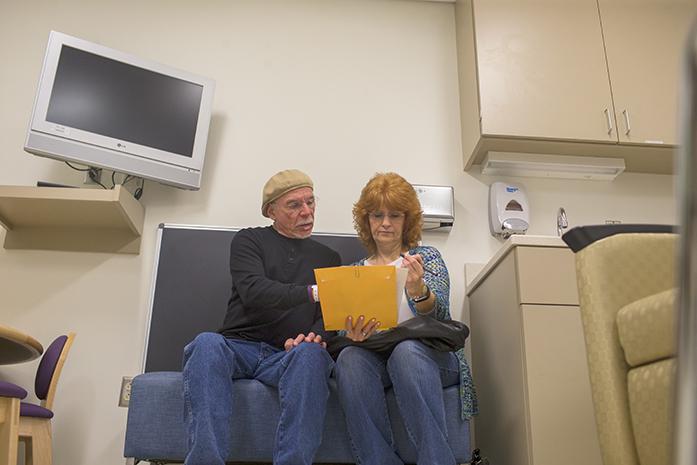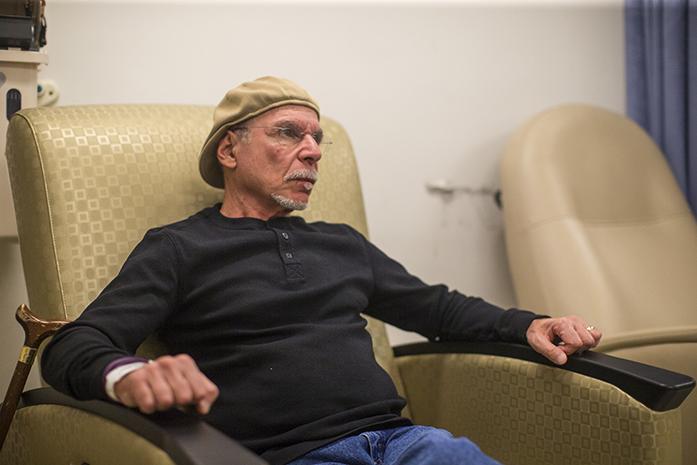Ricky Biagiola, the veteran drummer of the Outsiders, visited the University of Iowa Charcot-Marie-Tooth Clinic on Nov. 10 in an effort to understand his undiagnosed medical condition.
By Kasra Zarei
The term “outsider” has been used to describe a lot of things, but the beautiful diversity of humanity shows there are no outsiders in the world.
Ricky Biagiola is a perfect example of this is. A drummer of the rock-and-roll band the Outsiders, playing through an undiagnosed neuromuscular condition. The drummer visited the University of Iowa Charcot-Marie-Tooth Clinic Nov. 10 to try to solve the puzzling condition.
“I started playing drums, weekends and weeknights, when I was 14 years old,” he said.
When Biagiola still had weeks left in high school, he went on tour to play with the Outsiders.
“It was a thrill to say I was a part of the group, sitting on tour buses with some great names,” he said.
For 11 years, Biagiola was able to perform in cities across different states including his home state of Ohio. He then transitioned to a new job at an electric company, where he started having physical problems with his legs.
“I started out just rolling and twisting my ankles,” he said. “I had to put on eight bandages to prevent this.”
He went to a clinic in Cleveland, where he was given orthotic braces that allowed him to hide his leg issues.

Even with all the diagnostic tests, his neurologists could only say he had some sort of “multi-focal neuropathy with conduction block” in his calf muscles and hands.
“They weren’t able to narrow it down or put a name on my condition — the reality was that I’ve had it for a long time and am doing fine, and I’d just have to deal with it,” he said.
Biagiola was able to work with his condition into his early 60s, but his employers noticed him slowing down in work. So Biagiola and wife Lois decided the best thing for him to do was retire.
“I have no regrets, but I was a little disappointed and felt let go because of my condition,” Biagiola said.
Lifting a credit card from a table or buttoning a shirt are often taken for granted in life, but not for him. Imagine functioning after taping down the thumbs of the hand to the palm.
A friend, Mark Dyken, a University of Iowa professor of neurology and Biagiola’s bandmate, recommended that he visit the UI Charcot-Marie-Tooth Clinic, which diagnoses and treats people with the condition.
Charcot-Marie-Tooth is a form of peripheral neuropathy, or a dysfunction that affects the nerves that extend to the hands and legs.
“We get people from infancy to their 90s, and typically the muscles and nerves affected are farthest away from [the center of] the body,” said Shawna Feely, UI genetic counselor in the clinic.
There is a spectrum with Charcot-Marie-Tooth.
“Typically, Charcot-Marie-Tooth includes impairment of motor and sensory serves, but this isn’t true for all cases — some may have pure sensory or pure motor dysfunction,” Feely said.
This spectrum contains more than 50 forms of Charcot-Marie-Tooth, all of which can be passed on in families through different genes.
After Biagiola’s visit to the UI clinic, genetic testing is next to try to find his causative gene and diagnosis.
When it comes to Charcot-Marie-Tooth, there are no medical treatments that can slow or prevent symptoms after a genetic cause has been confirmed.
“I realize that I’m not going to get a cure or a treatment,” Biagiola said.
Nevertheless, Biagiola still wants to do his part to help others with a similar condition.
“I’m curious if there is something I could have done earlier to prevent my condition, mainly to educate others in a similar state,” he said.
Nevertheless, the drummer continues to drum, and Biagiola has continually been performing despite having to hold drumsticks differently and play with gloves.
He was recently approached to reform the band, and he hopes the rebirth will develop into something the group wants to do longer.
“Being a musician is probably what has helped him continue engaging his hands and legs to prevent further atrophy,” Dyken said.
Biagiola leads a normal life. Like everyone, he needs help every now and then, but fortunately, he has support from his wife.
“He is my hero,” Lois said. “From drumming to remodeling a house, this guy can do it all.”
Despite his afflictions and that he still doesn’t have the name of his condition, his abilities as a loving, hard-working husband, father, friend, and virtuoso have persisted.
As an epitome of the strength and beauty that is humanity, Biagiola is no outsider.



